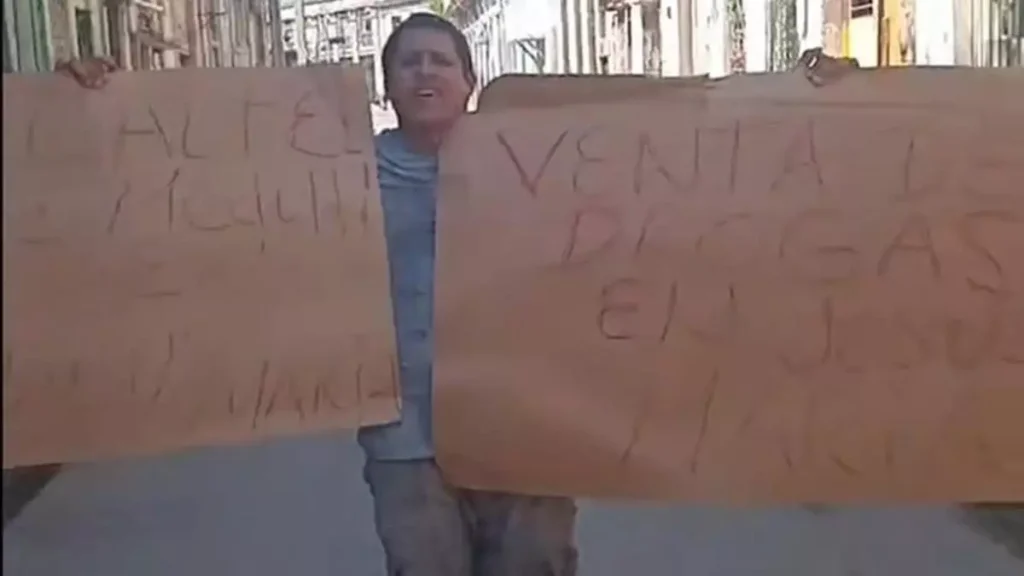“The ‘chemical’ is cheaper than a soft drink,” says Alberto Turis Betancourt, outraged

![]() 14ymedio, Havana, 5 September 2024 — Activist Alberto Turis Betancourt Pérez was arrested this Wednesday for taking to the streets to protest against the sale of drugs in his neighborhood, Jesús María, in Old Havana. Carrying two large handwritten signs, the man let himself be recorded while walking. He denounced that on Gloria Street, between Carmen and Rastro, narcotics are being sold – the “so-called ‘chemical’, crack and heroin” – with total impunity.
14ymedio, Havana, 5 September 2024 — Activist Alberto Turis Betancourt Pérez was arrested this Wednesday for taking to the streets to protest against the sale of drugs in his neighborhood, Jesús María, in Old Havana. Carrying two large handwritten signs, the man let himself be recorded while walking. He denounced that on Gloria Street, between Carmen and Rastro, narcotics are being sold – the “so-called ‘chemical’, crack and heroin” – with total impunity.
“A chemical is cheaper than a soft drink; they take drugs every day, they live for that,” Betancourt shouts in the video on his Facebook page. Meanwhile, “the police don’t act, mothers are tired of having their things stolen, the people are dying and no one is interested.” In addition, he warns: “I want you to know that my life can be in danger because I am no longer just talking about the regime, but about all criminals who sell drugs without any kind of punishment.”
Questioned by 14ymedio, Betancourt says that after his demonstration he was fined “by Section 21 for public disorder.” He posted on Facebook that “they sent a patrol car and took me to Dragones [Police Station]; they fined me and threatened me. None of this intimidated me; on the contrary, it gave me more strength to continue.” He says that he has spoken to the authorities and has even filed formal complaints, but nothing changes: “The traffickers continue to operate as if nothing had happened.”
The activist does not know the origin, but he does know “the more than ten who sell the drugs without fear of being arrested
“The drugs are brought in by motorcycle, and the neighbors of the block sell them,” he explains to this newspaper. The activist does not know the origin, but he does know “the more than ten who sell the drugs without fear of being arrested,” alluding to the complicity of the authorities.
Just a few weeks ago, in a segment on State TV’s Round Table program about the subject, the special guest, Juan Carlos Poey, head of the anti-drug body of the Ministry of the Interior, insisted that the source of the narcotics that enter Cuba is “90 miles away.” Several times he repeated that it is Cuban emigrants who bring ‘the chemical’ from the United States, a “synthetic cannabinoid,” with 45 variants that come “in powder, in liquid, mixed with acetone, impregnated in paper or cut with vegetables.”
He did recognize, however, the seriousness of the problem, calling it “complex,” and he emphasized that it is young people and adolescents who consume the most and increasingly at younger ages, a fact that he had already warned about in previous reports. “There is now consumption, holding and selling among young people; even teenagers between 16 and 19 years old get involved as sellers,” he said.
As for the Jesús María neighborhood, it is one of the most miserable in the capital, despite belonging to Old Havana, whose center, largely rehabilitated with foreign donations, receives a large influx of tourists. In it, crime, in fact, seems to be rampant. It is, according to one of its inhabitants, an 80-year-old man, “a place forgotten by God.”
Translated by Regina Anavy
____________
COLLABORATE WITH OUR WORK: The 14ymedio team is committed to practicing serious journalism that reflects Cuba’s reality in all its depth. Thank you for joining us on this long journey. We invite you to continue supporting us by becoming a member of 14ymedio now. Together we can continue transforming journalism in Cuba.
